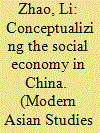|
|
|
Sort Order |
|
|
|
Items / Page
|
|
|
|
|
|
|
| Srl | Item |
| 1 |
ID:
121964


|
|
|
|
|
| Publication |
2013.
|
| Summary/Abstract |
This study offers a conceptual analysis of the social economy in China within the context of institutional transition. In China, economic reform has engendered significant social changes. Accelerated economic growth, privatization of the social welfare system, and the rise of civil society explain the institutional contexts in which a range of not-for-profit initiatives, neither state-owned nor capital-driven, re-emerged. They are defined in this research as the social economy in China. This study shows that although the term itself is quite new, the social economy is no new phenomenon in China, as its various elements have a rich historical tradition. Moreover, the impact of the transition on the upsurge of the Chinese social economy is felt not only through direct means of de-nationalization and marketization and, as a consequence, the privatization of China's social welfare system, but also through various indirect means. The development of the social economy in China was greatly influenced by the framework set by political institutions and, accordingly, legal enabling environments. In addition, the link to the West, as well as local historical and cultural traditions, contribute towards explaining its re-emergence. Examining the practices in the field shows that the social economy sector in China is conducive to achieving a plural economy and an inclusive society, particularly by way of poverty reduction, social service provision, work integration, and community development. Therefore, in contemporary China, it serves as a key sector for improving welfare, encouraging participation, and consolidating solidarity.
|
|
|
|
|
|
|
|
|
|
|
|
|
|
|
|
| 2 |
ID:
048553


|
|
|
|
|
| Publication |
Cambridge, Cambridge University Press, 1997.
|
| Description |
viii, 255p.
|
| Standard Number |
0521627613
|
|
|
|
|
|
|
|
|
|
|
|
Copies: C:1/I:0,R:0,Q:0
Circulation
| Accession# | Call# | Current Location | Status | Policy | Location |
| 040313 | 338.95125/COH 040313 | Main | On Shelf | General | |
|
|
|
|
| 3 |
ID:
105835


|
|
|
|
|
| Publication |
2011.
|
| Summary/Abstract |
Along with the emergence of the 'three rural issues' and rural crisis, a new co-operative movement has been witnessed in rural China, which is different from the former revolutionary communalist co-operative movement. This social movement can help to understand and rebuild civil society in China, which has, more often than not, been criticized as not genuine, civil nor society-based. Following the debate's background of the juxtaposition of a fast economic reform together with slow social and political reforms in China, the paper addresses a crucial question on the impact of economic development on civil society dynamics in China. By identifying the causal mechanisms of the new co-operative development and the conditions needed for them to develop, the paper presents some implications of the co-operative model in today's society. These causal mechanisms are set within the context of one historical process evolving with a path dependency. Using this theoretical framework, it further presents the empirical observations. Through the findings it is concluded that the new co-operative movement in rural China can be considered as a mild liberalization within civil society's sphere. While questioning a popularly used perspective examining the voluntary/non-profit nature of civil society organizations and excluding the economic aspect within civil society studies in China, the paper suggests an alternative approach representing an inclusive third sector with diverse organizations that combine both economic and social aims.
|
|
|
|
|
|
|
|
|
|
|
|
|
|
|
|
|
|
|
|
|